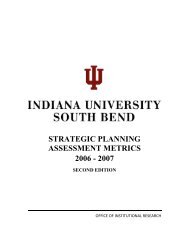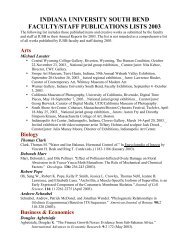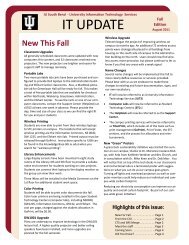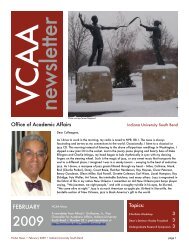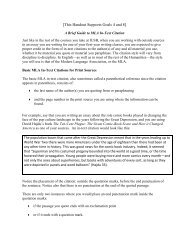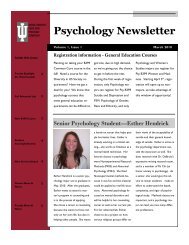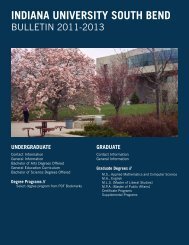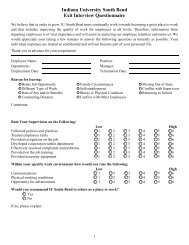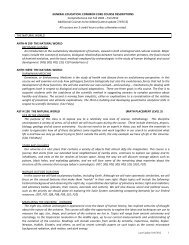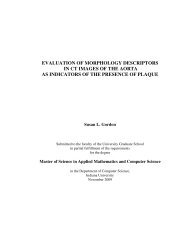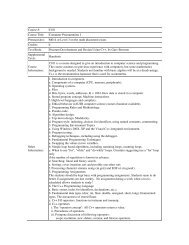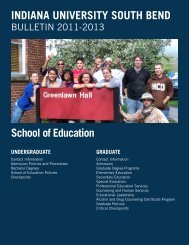Current version - Indiana University South Bend
Current version - Indiana University South Bend
Current version - Indiana University South Bend
You also want an ePaper? Increase the reach of your titles
YUMPU automatically turns print PDFs into web optimized ePapers that Google loves.
PURDUE UNIVERSITY COLLEGE OF TECHNOLOGY COURSE DESCRIPTIONS 4415<br />
ECET 15900<br />
ECET 19600<br />
ECET 20700<br />
ECET 20900<br />
ECET 21400<br />
Digital Applications (4 cr.)<br />
P: ECET 10700 and ECET 10900.<br />
This course continues the study of<br />
combinational and sequential digital<br />
applications using programmable and<br />
standard logic devices. The input and<br />
output characteristics of the various<br />
common logic families, the appropriate<br />
signal conditioning techniques for<br />
on/off power interfacing, digital and<br />
analog signal interfacing techniques,<br />
and memory devices and systems are<br />
discussed. II<br />
introduction to EcET and projects<br />
(2 cr.)<br />
This course introduces ECET projects<br />
and the ECET program. Included are<br />
topics about ECET projects, options<br />
and electives in the ECET curriculum,<br />
university services, study techniques,<br />
and student employment and career<br />
opportunities. Also introduced are<br />
techniques for proper and safe use of<br />
basic hand and machine tools, and the<br />
processes of fabricating, assembling, and<br />
testing printed circuit boards. I<br />
AC Electronics Circuit Analysis (4 cr.)<br />
P: ECET 15700, MA 15400 or MATH-M<br />
126. AC circuits including the j operator,<br />
phasors, reactance, and impedance are<br />
studied. Circuit laws, network theorems,<br />
and the fundamental concepts of Fourier<br />
analysis are applied and used in the study<br />
of topics such as passive filters, IC filters,<br />
amplifiers, resonant circuits, single- and<br />
three-phase circuits, and elementary<br />
magnetic circuits. I<br />
Introduction to Microcontrollers<br />
(4 cr.)<br />
P: ECET 15900. This course is an<br />
introduction to microprocessor hardware<br />
and software, focusing on embedded<br />
control applications. Interconnections<br />
of components, peripheral devices, bus<br />
timing relationships, structured C–<br />
language programming, debugging,<br />
input/output techniques, and the use of<br />
PC-based software development tools are<br />
studied.<br />
Electricity Fundamentals (3 cr.)<br />
P: MA 15900 or MATH-M 115. An<br />
introduction to elemental electrical<br />
components and their characteristics;<br />
basic electrical circuit theory; and use of<br />
basic laboratory test equipment, electrical<br />
motors, and industrial motor controls.<br />
Not open to ECET students. I<br />
ECET 23100<br />
ECET 23300<br />
ECET 25700<br />
ECET 29700<br />
ECET 30200<br />
Electrical Power and Control (4 cr.)<br />
P: MA 22100 or MATH-M 119, PHYS-P<br />
221. C: ECET 20700. This course<br />
introduces magnetic material and<br />
properties; followed by analysis of<br />
transformers and power conditioning<br />
equipment, induction motors, and singleand<br />
three-phase power systems. Motor<br />
control devices, programmable logic<br />
controllers, PLC input and output devices,<br />
and power systems communications and<br />
monitoring are introduced. II<br />
Electron Industrial Control (3 CR.)<br />
P: ECET 21400. Familiarization with<br />
electronics as applied to industry. Basic<br />
theory and application of electronics to<br />
controls for industrial equipment and<br />
data processing.<br />
Power and RF Electronics (4 cr.)<br />
P: ECET 20700. This course applies<br />
circuit analysis techniques to amplifiers<br />
used in power and RF electronics.<br />
Topics introduced include bipolar- and<br />
field-effect transistors, thyristors, RF<br />
oscillators, mixers, AM/FM modulation,<br />
phase lock loops, frequency synthesis,<br />
switching power supplies, and active<br />
filters. Computer-aided analysis of<br />
circuits is used.<br />
Electronic prototype development<br />
(4 cr.)<br />
P: ECET 19600, ECET 15900, and ECET<br />
20700. This course introduces project<br />
planning and the basic concepts in<br />
electronic design automation (EDA). The<br />
student develops a portion of an electronic<br />
system by utilization of: EDA, design for<br />
testing (DFT), surface mount technology<br />
(SMT), design for manufacturability<br />
(DFM), and component characteristic<br />
selection techniques. New construction<br />
and testing techniques are introduced.<br />
The final product is presented in a written<br />
and/or oral report. II<br />
Introduction To Control Systems<br />
(4 cr.)<br />
P: ECET 23100. This first course in<br />
industrial controls is applicationsoriented<br />
and includes on-off type<br />
open- and closed-loop control systems<br />
and analog-based systems. Major<br />
topics include relay and programmable<br />
controller-based systems.



